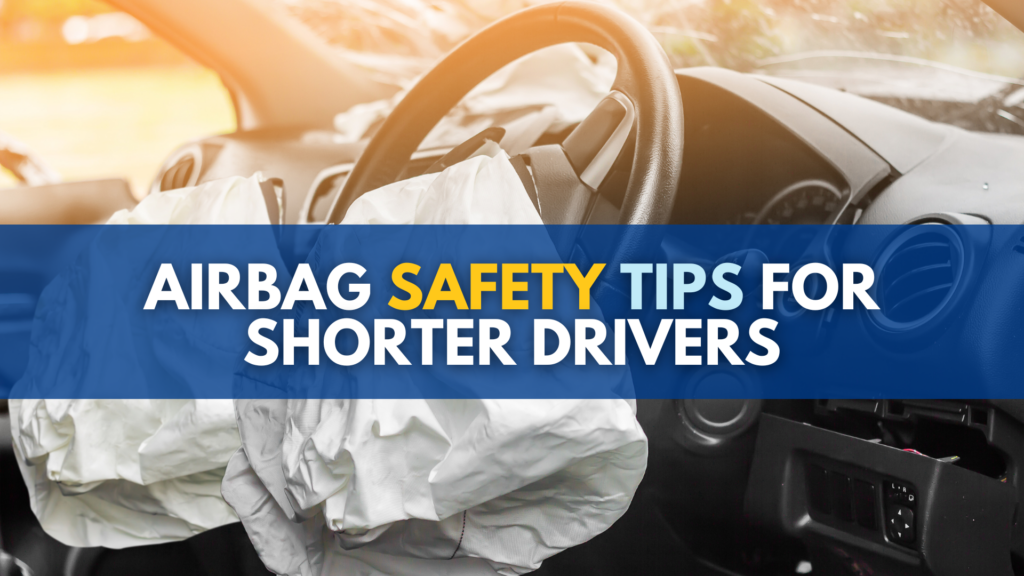The number one tip for airbag safety for short drivers is keeping a safe distance from the air-bag in their steering wheel. NHTSA recommends that there be 10 inches between the air-bag cover and a driver’s breastbone. This is best achieved by adjusting your seat position or through the use of pedal extensions.
Only in extreme cases, an air-bag on-off switch may be a last resort for motorists who are smaller in stature.
Why is airbag safety for short drivers so important?
Airbag safety for short drivers is so important because NHTSA states that the “first 2-3 inches after the air bag bursts through its cover and begins to inflate” is the “‘risk zone’” because that is when the air bag’s force is “the greatest” which can lead to
Frontal airbags can deploy at 200 mph, according to AAA.
NHTSA warns that “[b]ecause air bags deploy very rapidly, serious or sometimes fatal injuries can occur if the driver or passenger is too close to – or comes in direct contact with – the air bag when it first begins to deploy.”
NHTSA also emphasizes that “[o]ccupants who are very close to or on top of the air bag when it begins to inflate can be hit with enough force to suffer serious injury or death.”
What is a safe distance from a steering wheel?
According to the NHSTA and their airbag safety guidelines, a safe distance between a motorist and a steering wheel for tall and short drivers is 10 inches between the center of their breastbone and the airbag cover.
NHTSA explains that the closer a motorist gets to creating that distance, the lower his or her risk of an air bag injury will be and “the higher the chance of . . . being saved by the air bag.”
The 10-inch distance is key, according to NHTSA, because when a driver is seated 10 or more inches away from the steering wheel he or she will only make contact with the air bag “after it has completely or almost completely inflated. The air bag then will cushion and protect them from hitting the hard surfaces of the vehicle.”
NHTSA estimates that frontal air bags saved 50,457 lives over a 30-year period.
How can you change your driving position to improve airbag safety for short drivers?
You can improve airbag safety for short drivers if you change your “customary driving position” in one or more of the following ways: (1) move your seat back as far as you can while still being able to reach the pedals comfortably; (2) slightly recline your seat; and/or (3) tilt your steering wheel downward.
NHTSA explains in greater detail that “[i]f you now sit less than 10 inches away, you can change your driving position in several ways:”
- “Move your seat to the rear as far as you can while still reaching the pedals comfortably.”
- “Slightly recline the back of the seat. Although vehicle designs vary, many motorists can achieve the 10-inch distance, even with the driver seat all the way forward, simply by reclining the back of the seat somewhat. If reclining the back of your seat makes it hard to see the road, raise yourself by using a firm, non-slippery cushion, or raise the seat if your vehicle has that feature.”
- “If your steering wheel is adjustable, tilt it downward. This points the air bag toward your chest instead of your head and neck.”
Pedal extensions and airbag safety for short drivers
You can improve airbag safety for short drivers through pedal extensions which are devices that can be bolted onto a vehicle’s accelerator and brake pedals. The extensions effectively bring the pedals closer to motorists of smaller stature so the motorists can sit at a safe distance from the air bag cover on the steering wheel.
Significantly, as an alternative to pedal extensions, some vehicle manufacturers now offer power adjustable pedals that move as much as three inches closer to the driver.
In Michigan, according to the airbag safety guildelines for short drivers provided by NHTSA, motorists of “extremely small stature” – 4 feet 6 inches or less – who must sit dangerously close to the air bag in their vehicle’s steering wheel, NHTSA may allow them to install a driver air bag on-off switch when “the risk of sitting in front of an active frontal air bag outweigh the safety benefits.”
What you should do if you were injured by an air-bag
If you or a loved one has been injured by an air-bag, there are a number of steps to take:
- Preserve the vehicle – Do not have it repaired or let it be sold until it has been inspected by experts
- Take photographs of the vehicle AND your personal injuries
- Consult with an experience personal injury lawyer who will look out for your best interests and help to defeat false claims often used by auto manufacturers to avoid being held accountable for air-bag related injuries or deaths
Injured in a crash and need legal help? Call the car accident attorneys at Michigan Auto Law
Unfortunately, even if tall or short drivers follow the airbag safety guidelines, injuries can still happen after a car accident. If you or a loved one were injured in car accident – by an air-bag or otherwise, call now (800) 968-1001 for a free consultation with one of our experienced car accident lawyers. There is no cost or obligation. You can also visit our contact page or use the chat feature on our website.
Michigan Auto Law is Michigan’s largest and most successful law firm that specializes exclusively in helping people who have been injured in auto accidents.
Our secret? Our attorneys deliberately handle fewer cases than other personal injury law firms. This allows us to focus more time and attention on our cases.
Unlike other law firms, our attorneys are never too busy to promptly return phone calls and answer questions.
We have more than 2,000 5-Star reviews that reflect this care and attention to detail.
More importantly, this client-focused approach leads to better and faster settlements for our clients. Michigan Auto Law has recovered more million-dollar settlements and trial verdicts for motor vehicle accidents than any other lawyer or law firm in Michigan. We’ve also recovered the highest ever reported truck accident and car accident settlement in the state.
Call now so we can start making a real difference for you.



